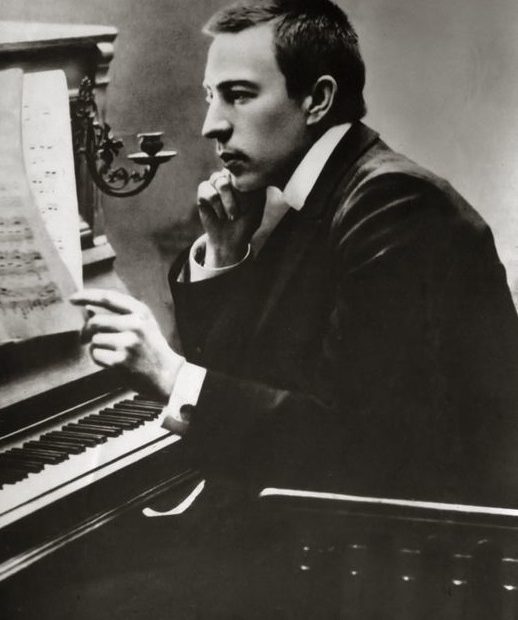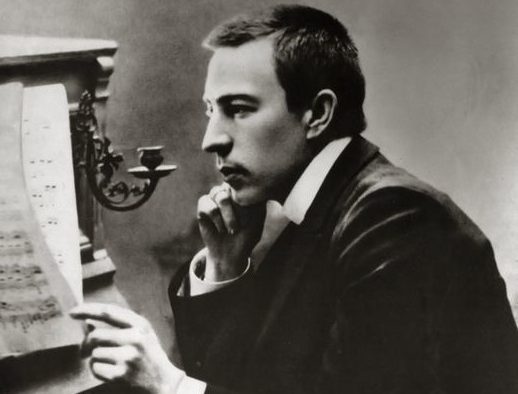
Depression And The Composer: Rachmaninoff’s Story
Franz Liszt once said, “Mournful and grand is the destiny of an artist.” Was he referring to the seemingly large proportion of artists that suffer from some sort of mental disorder?
Sergei Rachmaninoff was one. He dealt with depression his whole life, but his is a success story. Not only did he mostly overcome his disability, but his management of it fueled his composing.
Rachmaninoff’s symptoms were first noticed by his family and friends after the death of his idol, Tchaikovsky, in 1894. Even as his career was taking off he was prone to bouts of depression and apathy. During these periods his composing became sporadic and he even cut a piano tour short because he lost interest and enjoyment in performing.
Dr. Conny Kirchhoff, Assistant Director of the Psychology Clinic at Washington State University, says, “Clinical depression is marked by a significant change in activity over a significant amount of time – usually a minimum of two weeks. A person can feel sad, empty, hopeless, or lose pleasure in daily activities.” According to Dr. Kirchhoff, the main difference between feeling sad and being depressed is the amount of time, and the impact to everyday life.
For years, Rachmaninoff dealt with his depression the same way people have for centuries before modern therapies – he lived with it, he coped and he tried to move on. But then came a catalyst: the total disaster that was the premier of his first symphony.
For the next three years, Rachmaninoff was in a downward spiral – he barely composed and rarely performed. There was some good to come out of this rough period, however. He began gaining more confidence and experience as a conductor, he traveled, and became engaged to a long-time friend, Natalia Satina. His depression worsened until his family stepped in.
In early spring of 1900, Rachmaninoff’s aunt suggested he try a new treatment from Sigmund Freud called psychoanalysis. Rachmaninoff took this aunt’s advice and started seeing therapist Nicolai Dahl, a physician practicing hypnotherapy and psychotherapy.
By that summer, Rachmaninoff was back to composing and months later he was at the piano in front of an audience – confidence restored and playing portions of his Piano Concerto No. 2. When he finished the concerto, one year after starting therapy, he dedicated it to Dahl.
So hypnosis worked for Rachmaninoff, but what does Dr. Kirchhoff have to say about it?
“There are lots of studies out there. Only a few treatments are proven effective.” At the WSU Psychology Clinic, Dr. Kirchhoff trains graduate students in clinical work and how to set up and run clinical studies. She teaches her students to use evidence-based therapies and techniques. “There’s not enough evidence on hypnotherapy, no scientific support. That doesn’t mean it doesn’t work. If it was effective for him, that’s a great outcome.”
Great outcome or not, Rachmaninoff continued to struggle with periods of depression contrasted with periods of intense activity throughout his life. But Dr. Kirchhoff says that’s normal. One therapy she teaches her students is Cognitive Behavior Therapy, or CBT, which is all about long lasting maintenance. “While we sometimes see immediate success when a patient gets out of their rumination cycles or starts to become more engaged in life again, it often takes a while, sometimes years of working with a therapist or physician to change behaviors and mental processes.”
Rachmaninoff’s isn’t a unique story. It’s one that is still repeating itself today. Kirchhoff stresses the importance of talking about depression and mental health issues to lower the negative stigma. “Thirty percent of the population suffers from depression at some time,” she says. “It’s important to take it serious and not lightly.”
Dr. Conny Kirchhoff is an Assistant Professor of Psychology and Assistant Director of the Psychology Clinic at Washington State University.
UPDATE: Dr. Kirchhoff’s quote about “immediate success” was adjusted at her request to include both cognition and behavior change as effective areas of intervention to treat people with depression.
Related Stories:

Reeder’s Movie Reviews: A Complete Unknown
In director James Mangold’s new film, Timothée Chalamet portrays the young Bob Dylan (the professional name he adopted at age 21) from 1961-1965. He gives a remarkably nuanced, accomplished performance in a movie that occasionally gets bogged down in truncated or unnecessary scenes, but not too often. The supporting cast shines as well.

Reeder’s Movie Reviews: Nosferatu
A classic tale laced with horrific, religious, folkloric and erotic themes. Robert Eggers seemed destined to make a movie about it. Finally, after a decade of preparation, he has.

Reeder’s Movie Reviews: Maria
“Maria Callas was someone that as she was singing, she was dying every time. Life was taken from her while she sang.” The Chilean writer-director Pablo Larrain has a fascination with mortality. The manifestations of it course throughout his work. In many respects, it inspires his art.
















